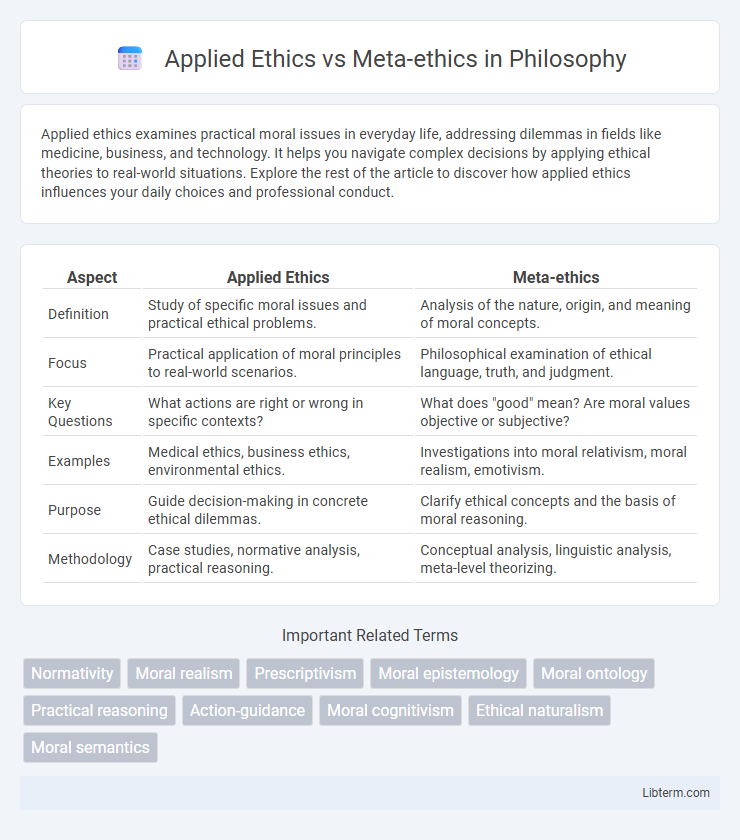Applied ethics examines practical moral issues in everyday life, addressing dilemmas in fields like medicine, business, and technology. It helps you navigate complex decisions by applying ethical theories to real-world situations. Explore the rest of the article to discover how applied ethics influences your daily choices and professional conduct.
Table of Comparison
| Aspect | Applied Ethics | Meta-ethics |
|---|---|---|
| Definition | Study of specific moral issues and practical ethical problems. | Analysis of the nature, origin, and meaning of moral concepts. |
| Focus | Practical application of moral principles to real-world scenarios. | Philosophical examination of ethical language, truth, and judgment. |
| Key Questions | What actions are right or wrong in specific contexts? | What does "good" mean? Are moral values objective or subjective? |
| Examples | Medical ethics, business ethics, environmental ethics. | Investigations into moral relativism, moral realism, emotivism. |
| Purpose | Guide decision-making in concrete ethical dilemmas. | Clarify ethical concepts and the basis of moral reasoning. |
| Methodology | Case studies, normative analysis, practical reasoning. | Conceptual analysis, linguistic analysis, meta-level theorizing. |
Introduction to Applied Ethics and Meta-ethics
Applied ethics examines practical moral issues by analyzing specific real-world scenarios such as medical decisions, environmental policies, and business conduct to guide ethical behavior. Meta-ethics explores the nature, origin, and meaning of ethical concepts, focusing on questions about moral truth, objectivity, and the language used to express moral judgments. Understanding these two branches provides a comprehensive framework for addressing concrete ethical problems while critically evaluating the foundations of moral reasoning.
Defining Applied Ethics: Practical Moral Questions
Applied ethics addresses practical moral questions by analyzing specific issues such as medical ethics, environmental concerns, and business conduct, providing concrete guidelines for decision-making. It focuses on real-world ethical dilemmas where theoretical principles are implemented to resolve conflicts and promote ethical behavior. This branch contrasts with meta-ethics, which explores the nature, origin, and meaning of ethical concepts without directly prescribing actions.
Understanding Meta-ethics: The Study of Moral Language
Meta-ethics explores the nature, meaning, and foundations of moral language, analyzing concepts such as truth, reference, and semantics in ethical statements. It seeks to understand whether moral judgments express emotions, commands, or objective truths by investigating theories like moral realism, emotivism, and prescriptivism. This study contrasts with applied ethics, which addresses concrete moral issues, by focusing on the underlying linguistic and philosophical structure of ethical discourse.
Key Differences Between Applied Ethics and Meta-ethics
Applied ethics addresses practical moral issues by evaluating specific actions and their ethical implications in real-world contexts, such as medical ethics or business ethics. Meta-ethics explores the nature, meaning, and foundations of ethical language, concepts, and judgments, analyzing questions about moral objectivity and the origin of moral values. Key differences include applied ethics' focus on normative guidance for behavior versus meta-ethics' emphasis on the theoretical underpinnings and semantics of ethical statements.
Core Principles of Applied Ethics
Applied ethics centers on concrete moral principles guiding practical decision-making in fields like medicine, law, and business, emphasizing principles such as autonomy, beneficence, non-maleficence, and justice. Meta-ethics explores the nature, origin, and meaning of ethical concepts, questioning what moral terms signify and how ethical truths can be known or justified. Core principles of applied ethics function as actionable norms for resolving specific ethical dilemmas, whereas meta-ethics provides the foundational understanding of these principles' validity and context.
Core Concepts in Meta-ethics
Meta-ethics explores the nature, origin, and meaning of ethical concepts, focusing on core ideas such as moral realism, relativism, and subjectivism. It examines whether moral values are objective truths or culturally dependent constructs, analyzing the language and logic used in ethical discourse. Applied ethics utilizes these foundational theories to address practical moral issues in fields like medicine, business, and environmental policy.
Real-world Examples of Applied Ethics
Applied ethics addresses practical moral issues by applying ethical theories to real-world dilemmas such as medical consent, environmental sustainability, and business integrity. For example, bioethics involves decisions about patient confidentiality and end-of-life care, while environmental ethics tackles climate change policies and resource conservation. These concrete scenarios contrast with meta-ethics, which explores the nature, meaning, and foundations of moral concepts rather than specific ethical decisions.
Major Theories in Meta-ethics
Major theories in meta-ethics include moral realism, which asserts that moral facts exist independently of human beliefs, and moral anti-realism, which denies such objective moral truths. Another significant theory is expressivism, suggesting that moral statements express emotional attitudes rather than factual claims. Additionally, error theory posits that although moral language attempts to refer to objective values, all such claims are systematically false.
Interactions and Overlaps: Bridging Applied Ethics and Meta-ethics
Applied ethics addresses practical moral dilemmas by utilizing normative ethical theories that stem from meta-ethical inquiries into the nature of morality, truth, and value. The interaction between applied ethics and meta-ethics creates a feedback loop where meta-ethical analysis clarifies foundational concepts such as moral relativism or objectivity, which then guide specific ethical decision-making in fields like bioethics or environmental ethics. This overlap fosters a comprehensive ethical framework that enhances both theoretical understanding and practical application in complex moral scenarios.
Conclusion: The Importance of Both Branches in Ethical Discourse
Applied ethics provides practical guidance for real-world moral dilemmas, addressing issues like biomedical ethics, environmental ethics, and business ethics. Meta-ethics explores the nature, meaning, and foundations of ethical principles, clarifying concepts such as moral truth, objectivity, and language. Both branches are essential in ethical discourse, as applied ethics offers actionable solutions while meta-ethics ensures a rigorous understanding of ethical frameworks.
Applied Ethics Infographic

 libterm.com
libterm.com